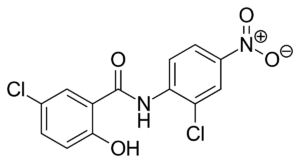Niclosamide (pictured) is a drug that has been approved in humans to treat infections with a variety of tapeworms. It might be useful for preventing SARS-CoV-2 replication and COVID-19 pathogenesis by inhibiting virus-catalyzed membrane fusion.
Examination of the lungs of 41 patients who died of COVID-19 revealed, in addition to expected lung injury, the presence of syncytia. Such giant cells contain many nuclei and are produced when SARS-CoV-2 infected cells fuse with neighboring, uninfected cells. The fusion occurs when the spike protein of SARS-CoV-2, present on the plasma membrane of infected cells, attaches to the receptor ACE2 on a neighboring cell. This interaction would normally allow virus particles to fuse on entry into cells. In this case, the interaction leads to fusion of neighboring cells. Production of only the spike protein in cells in culture also leads to formation of syncytia.
These observations suggested that a drug that inhibits syncytium formation might help alleviate the severe lung injury observed in some COVID-19 patients. Screening of over 3000 small molecules for their ability to inhibit cell fusion identified a variety of candidates which had in common the ability to regulate intercellular calcium levels. Some of these compounds, such as Niclosamide, inhibited both membrane fusion and virus reproduction.
Niclosamide is an inhibitor of the calcium-activated TMEM16 family of chloride channels. Production of spike in SARS-CoV-2 infected cells leads to activation of TMEM16, which is required for syncytium formation. These observations explain why inhibition of TMEM16 by niclosamide impairs formation of syncytia.
Based on its known activities, activation of TMEM16 by SARS-CoV-2 infection might not only stimulate formation of syncytia, but could also promote inflammation, thrombosis, and diarrhea, the latter through promotion of chloride secretion from cells. Hence the drug might be useful for treating COVID-19 disease and might have efficacy later in infection when antivirals are not effective.


Dcould spike protein production from vaccines lead to syncytial cell production or unlike cells in culture an intact virus is needed
Hi Dr Racaniello,
This drug is not available in the US.